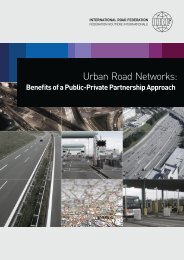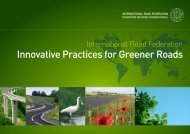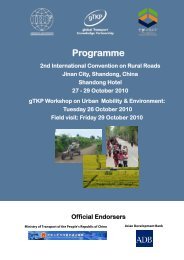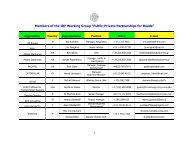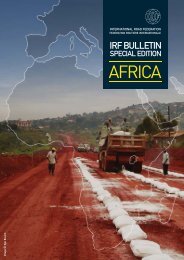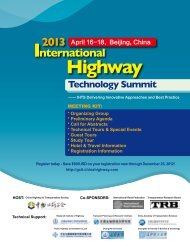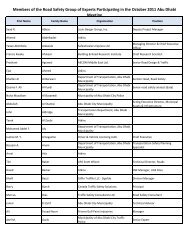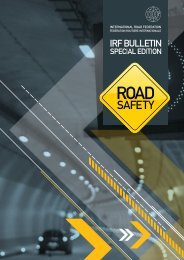TRANSPORT
TRANSPORT
TRANSPORT
- No tags were found...
Create successful ePaper yourself
Turn your PDF publications into a flip-book with our unique Google optimized e-Paper software.
SOCIO-ECONOMIC BENEFITS<br />
The Roads 2000 Concept is a road maintenance strategy<br />
that advances the use of the best possible combination of<br />
optimum labour force and equipment wherever technically<br />
and economically feasible, and where work can be<br />
delivered in a manner that is socially and environmentally<br />
responsible.<br />
The Government of Kenya (GoK), with the assistance of<br />
key development partners, instigated this maintenance<br />
concept in the early 1990’s and envisioned that it should be<br />
fully operational at national level by the turn of the century<br />
- hence the generic name “Roads 2000”.<br />
The Roads 2000 Programme represents the country’s<br />
principal implementation strategy for road maintenance,<br />
and its main features include:<br />
• The use of an optimum mix of labour and equipment<br />
• Increased use of local resources<br />
• Adoption of a network approach instead of the<br />
conventional link approach<br />
• Provision of an employment-based social protection<br />
mechanism for marginalised sections of the community<br />
These objectives are in line with the national development<br />
aspirations of the GoK, and firmly anchor the Roads 2000<br />
programme to the Millennium Development Goals (MDGs).<br />
The Roads 2000 programme is also in line with the priorities<br />
of Kenya’s Decent Work Country Programme, supported by<br />
the International Labour Organization (ILO) – particularly<br />
with respect to employment creation, youth development,<br />
prevention of HIV/AIDS and expansion of social protection.<br />
The GoK, with the assistance of key development partners,<br />
has implemented several Roads 2000 projects in various<br />
parts of Kenya over the last five years. These projects are<br />
currently coordinated by the Kenya Rural Roads Authority<br />
(KeRRA), with ILO providing technical assistance. The main<br />
output areas of these projects include the improvement<br />
and maintenance of rural roads; provision of technical and<br />
managerial training to the staff of implementing agencies<br />
and emerging small-scale contractors; development<br />
of management tools; mainstreaming of rights-based<br />
planning; introduction of environmental conservation; and<br />
HIV/AIDS protection and prevention as an integral part of<br />
road project implementation.<br />
The Roads 2000 concept has since been adopted in the Vision<br />
2030 national development policy and acknowledged as<br />
a vehicle for employment creation and poverty reduction,<br />
particularly in relation to road infrastructure delivery.<br />
Several donor countries have also supported the Roads<br />
2000 maintenance concept, recognising its potential for<br />
triggering local economic development and advancing<br />
social equality.<br />
One of the strengths of the Roads 2000 approach is the<br />
promotion and observance of workers’ rights, gender<br />
equality, environmental conservation and community<br />
participation. In short, it involves the provision of decent<br />
work for the masses of unemployed people in Kenya. The<br />
term “decent work” is often used to emphasise the fact<br />
that the Roads 2000 approach is not only about creating<br />
jobs. Rather it is concerned with:<br />
• Providing jobs that beneficiaries willingly take up and<br />
are proud to participate in;<br />
• Observing and ensuring workers rights and dignity;<br />
• Ensuring equity and shared growth;<br />
• Promoting community participation and giving<br />
marginalised communities a voice; and<br />
• Planting the seeds of sustainable livelihoods through<br />
investment in seemingly short-term projects.<br />
Site workers undergoing<br />
an HIV/AIDS Test<br />
Significant progress has been made over the last five years<br />
in rolling out the Roads 2000 programme nationwide –<br />
with encouraging success stories including, among others:<br />
• Improving more than 7,000 km of rural roads and<br />
putting them under maintenance.<br />
• Generating about 4,4 million person days of<br />
employment (equivalent to about 20,000 full-time<br />
jobs).<br />
• Injecting more than 1 billion Kenyan Shillings (US$13<br />
million) into rural Kenya through payment of wages.<br />
• Reaching women and youth, who constituted upwards<br />
of 25% and 40% respectively of direct beneficiaries of<br />
the programme.<br />
• Training 476 construction and maintenance contractors,<br />
435 site supervisors and 235 implementing agency<br />
staff.<br />
Community Consultations<br />
10<br />
| IRF BULLETIN SPECIAL EDITION: RURAL <strong>TRANSPORT</strong>, VOLUME-2






